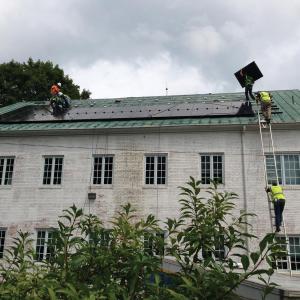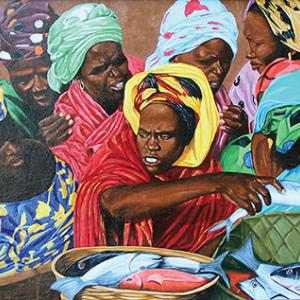
Erin Tocknell is the author of Confederate Streets, a memoir that explores the history of desegregation efforts in Nashville. She teaches English and advises a writing-based outreach program in Chattanooga, Tenn.
Posts By This Author
It's Always Sunny in West Virginia
Generating power, faith, and jobs with Solar Holler.
JUST A FEW YEARS AGO, Dan Conant was living a life familiar to generations of West Virginians. Born and raised in the state’s Eastern Panhandle, he’d gone to college and left West Virginia to build a career for himself. But Conant, who was working on community solar panel projects in Vermont, couldn’t shake the feeling that he was needed back home, where the shuttering of the coal industry threatened the few employment opportunities that remained.
“It was almost too easy in Vermont,” he recalled. “I needed to be back in West Virginia.”
In 2013, he and his wife, Laura Nagel, a Pittsburgh native, returned to Jefferson County and “Solar Holler,” a crowd-funded venture that installs solar panels for no cost at nonprofits, was born.
“Free, local electricity allows [nonprofits] to put resources toward what matters—including taking care of our neighbors—and creation,” the organization explains on its website.
Solar Holler’s unique crowd-funding model is designed to function within the restrictions of West Virginia’s power industry legislation that, unsurprisingly, favors coal. Nationally, the solar industry relies on tax credits, for which nonprofits in West Virginia are ineligible. Solar Holler’s early efforts to circumvent this barrier—by selling solar panels directly to a church—were shut down by state lawmakers.
The Art of Escape
How a man wrongfully convicted of murder used magazines, broken brushes, and paint to get free - and is teaching others to do the same.
PROFESSIONAL-GRADE paint brushes are about 10 inches long, with enough heft to balance in one hand, allowing the artist the control necessary to usher an idea into paint-and-canvas reality.
For more than 20 years, Ndume Olatushani used brushes with handles that were mere stubs. Fearing that a full-length brush could be sharpened into a knife, officials at the Riverbend Maximum Security Institution in Nashville, Tenn., cut them to about a third of their original length. To paint, Olatushani wet magazines and rolled them tightly around the broken ends. Once dry, the hardened pages worked almost as well as regular handles. Olatushani would then prop a canvas on his knee—easels weren’t allowed and his cell barely had space for one anyway—and paint.
The guards didn’t want Olatushani to have a weapon, but he did: The magazine-handled brushes kept him alive, bringing to life the world of his mind decades before he was freed from the monochrome world of prison.
“Art was freedom to me,” Olatushani explained. “I was literally walking in the shadow of death, but I was able to escape into the world I wanted, that I was able to create inside my head. Being able to do that made it possible for me to come through the other end.”
A happy medium
In 1985, after a seven-day trial in which prosecutors withheld evidence, a key witness lied, and an alibi was overlooked, Ndume Olatushani, then known as Erskine Johnson, was convicted of a murder that had been committed two years before. It took the all-white jury less than two hours to sentence him to death.
Thanks to the efforts of lawyers who took on his case pro bono in the ’90s, Olatushani’s death sentence was overturned in 1998. And after nearly 27 years imprisoned for a crime he did not commit, he finally walked away from the Shelby County Jail in Memphis on June 1, 2012.

